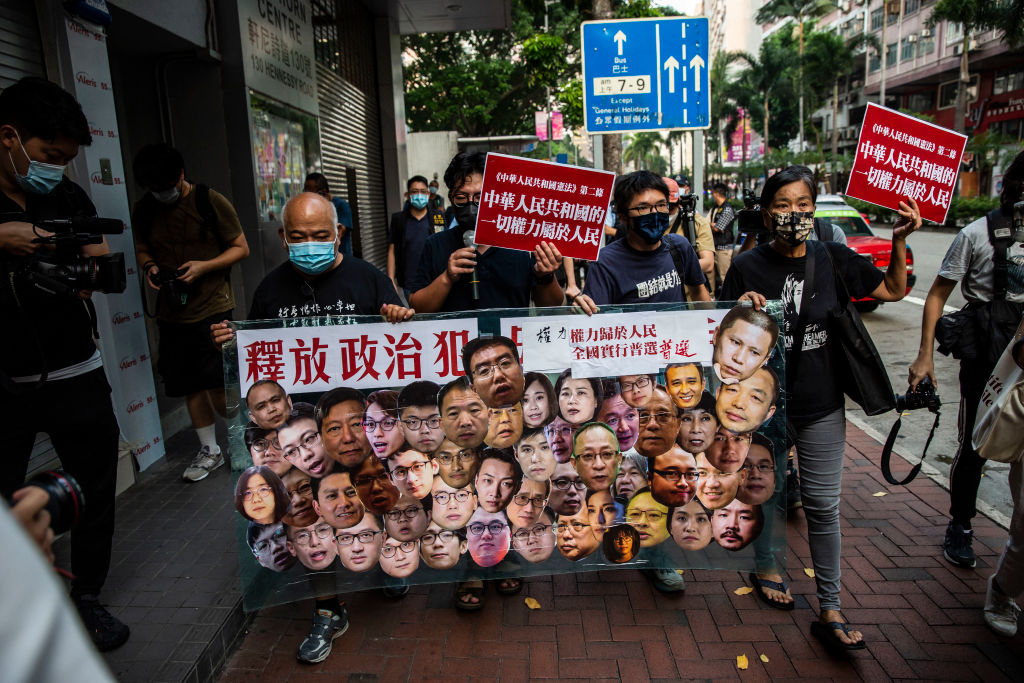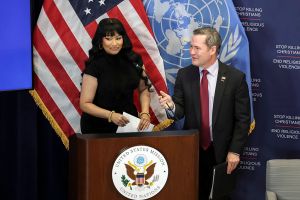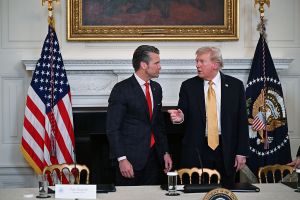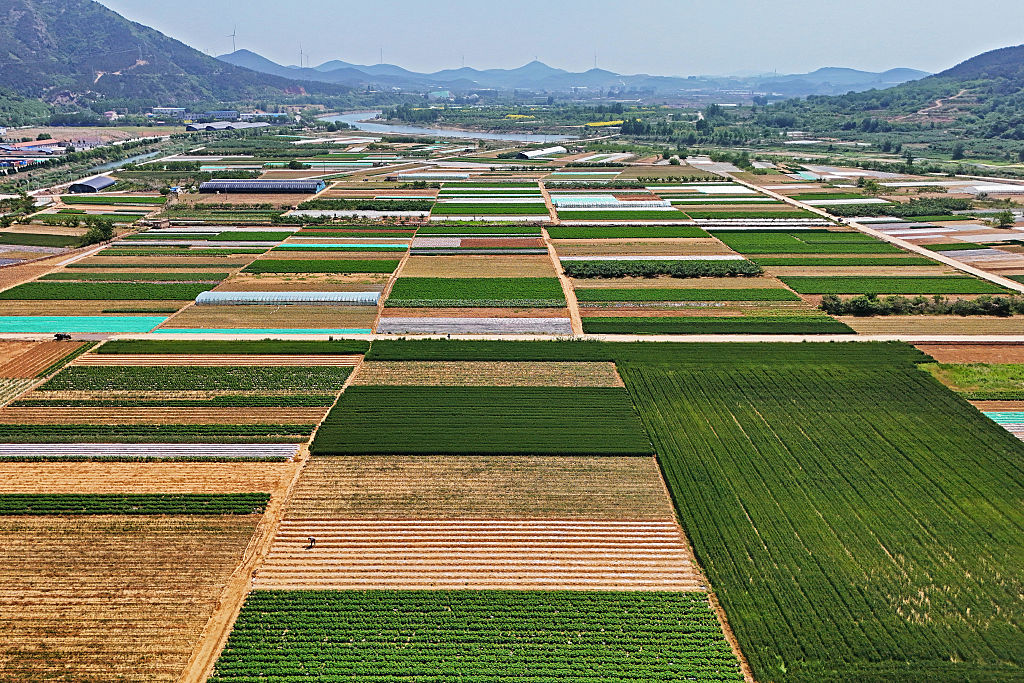Forty years ago today, British prime minister Margaret Thatcher and China’s Premier Zhao Ziyang signed the Sino-British Joint Declaration, an international treaty designed to pave the way for the handover of Hong Kong to China on July 1, 1997. Meeting in the Great Hall of the People in Beijing, leaders of the Chinese Communist Party (CCP) regime promised to respect a “high degree of autonomy” for Hong Kong and uphold the territory’s way of life, including its basic freedoms and the rule of law for at least fifty years from the time of the handover.
They lied — or at least, they broke their promises. Forty years on, that treaty — registered at the United Nations — and the promises within it lie in tatters. Xi Jinping’s CCP regime has ripped it up and trampled on it, dismantling almost all of Hong Kong’s freedoms, undermining the rule of law and unleashing a takeover of the city that leaves it an autonomous region only in name.
Over the past several decades, Britain has been profoundly naive in its foreign policy towards China
I lived in Hong Kong for the first five years after the handover, and I would say from my experience that — at least on the surface — in the early years, Beijing by and large kept to its word. Freedom of expression and press freedom were intact and, as a journalist during those early years, I was able to write and publish commentary critical of both the Beijing and Hong Kong governments that today would never be allowed in print and would likely land me in jail. Pro-democracy political parties contested elections, won seats in the legislature and formed a vocal opposition to Beijing.
Of course it was not perfect — the legislature had an in-built pro-establishment majority due to the seats reserved for representatives of business and professional sectors, known as the “functional constituencies” — and under the surface Beijing worked to ensure that it was in control. But nevertheless, promises of freedom of expression, press freedom, academic freedom, religious freedom and freedom of association and assembly, and the rule of law, were largely honored.
Yet over the past decade or more, and most intensively in the past five years, Beijing has wound back its promises and launched a repressive crackdown on what was once one of Asia’s freest and most open cities.
Since the police brutality against peaceful protesters in 2019 and the imposition of the draconian national security law in 2020, almost all pro-democracy politicians have been jailed, exiled or silenced, almost all civil society shut down and almost all independent media closed. Journalists, lawyers, human rights defenders and peaceful protesters are among the thousand or more political prisoners in Hong Kong today.
A month ago, forty-five former elected legislators and pro-democracy campaigners were sentenced to harsh prison terms simply for having participated in a “primary” election to choose their candidates for what would have been the legislative council elections in 2020. In the end, those elections were postponed, the pro-democracy camp was kicked out of the legislature and the rules rewritten. The legislature was turned into a puppet parliament packed with pro-Beijing loyalists by a new law stipulating that only those who could prove loyalty to Beijing could stand for public office.
Last month, the trial of Hong Kong’s most famous dissident, media entrepreneur Jimmy Lai, a seventy-seven-year-old British citizen and founder of the Apple Daily newspaper, resumed. Mr. Lai has been in solitary confinement for the past four years, his newspaper was forced to close in 2021, and he faces the very real likelihood of dying in jail.
Is any of this what Margaret Thatcher signed up to in the Great Hall of the People forty years ago? I don’t think so.
Over the past several decades, Britain — and the entire free world — has been profoundly naive in its foreign policy towards China. Perhaps in the 1990s and the early years of the 2000s there were reasons to be optimistic. Despite the 1989 Tiananmen Square massacre, there was a sense in the subsequent two decades that as China opened and grew economically, it would relax politically and socially. Living and traveling in China at that time, I experienced and shared that sentiment myself.
But ever since Xi Jinping came to power twelve years ago — and even several years before that — the warning signs were flashing for anyone who chose to pay attention. The problem is, successive governments have adopted an ostrich-like mentality, choosing — with remarkable dexterity — to bury their heads in the sand, stick their fingers in their ears and cover their eyes to the CCP’s intensifying repression at home and aggression abroad.
That naive belief that China under the CCP could be Britain’s friend, or at least a reliable trading partner, instead of what it is — the most significant threat to British security and freedoms — is exposed by the recent debacle over Prince Andrew’s Chinese spy friend. The fact that a senior CCP agent could penetrate Buckingham Palace, St. James’s Palace and Windsor Castle through the hapless stupidity of the Duke of York illustrates just how grave the threat is.
It isn’t as if the experts haven’t been warning of this for a while. The heads of UK intelligence agencies have highlighted the security threat China poses for several years. MI5 chief Ken McCallum has spoken of the “epic scale” of Beijing’s espionage. And in 2023 the joint intelligence committee in Parliament published a detailed report which said that China had penetrated “every sector” of the UK economy in a “whole of state” assault to which the government’s response has been “completely inadequate.” Without swift, decisive action, we face a “nightmare scenario” where China could post “an existential threat” to liberal democracy, it concluded.
Yet despite all this — and China’s increasing threats to Taiwan, the genocide of the Uighurs, atrocities in Tibet and the brutal repression of dissent within mainland China itself — Keir Starmer wants a “strong” and “pragmatic” relationship with Beijing.
Well I have to tell the prime minister, the strong and pragmatic thing to do would be to recognize that the CCP can never be trusted to keep its word. Its ambitions to infiltrate, intimidate and influence every aspect of our society — economic, academic, political and security — are absolutely real. To boot, the most pragmatic thing he could do is to activate the foreign influence registration scheme and list China top of the list of foreign influence threats.
Earlier this month, a group of British politicians found some spine and stood up to China’s CCP regime. They woke up and rejected the naivety of the past forty years. They realized that no matter how charming Beijing’s agents may be, they can never be trusted.
Who were these brave politicians? Not senior cabinet ministers. No, they were the members of Tower Hamlets council, who for the second time unanimously rejected China’s application to turn the old Royal Mint — right beside Tower Bridge — into the new People’s Republic of China embassy. Sir Keir Starmer and his deputy, Angela Rayner, who has ultimate responsibility for this decision, must listen to the brave representatives of Tower Hamlets, who have shown more courage on China over a year or two than successive British ministers and diplomats have shown in half a century.
Forty years on from the shameful trust we placed in the hands of the liars — and butchers — of Beijing, it is time for Britain to learn its lesson. No deal with murderous tyrants is worth the paper it is written on. No agreement with barbaric Communist dictators can ever be relied upon. We need to rediscover our values, recover our nerve, stop kowtowing and stand up once again against tyranny.


























Leave a Reply